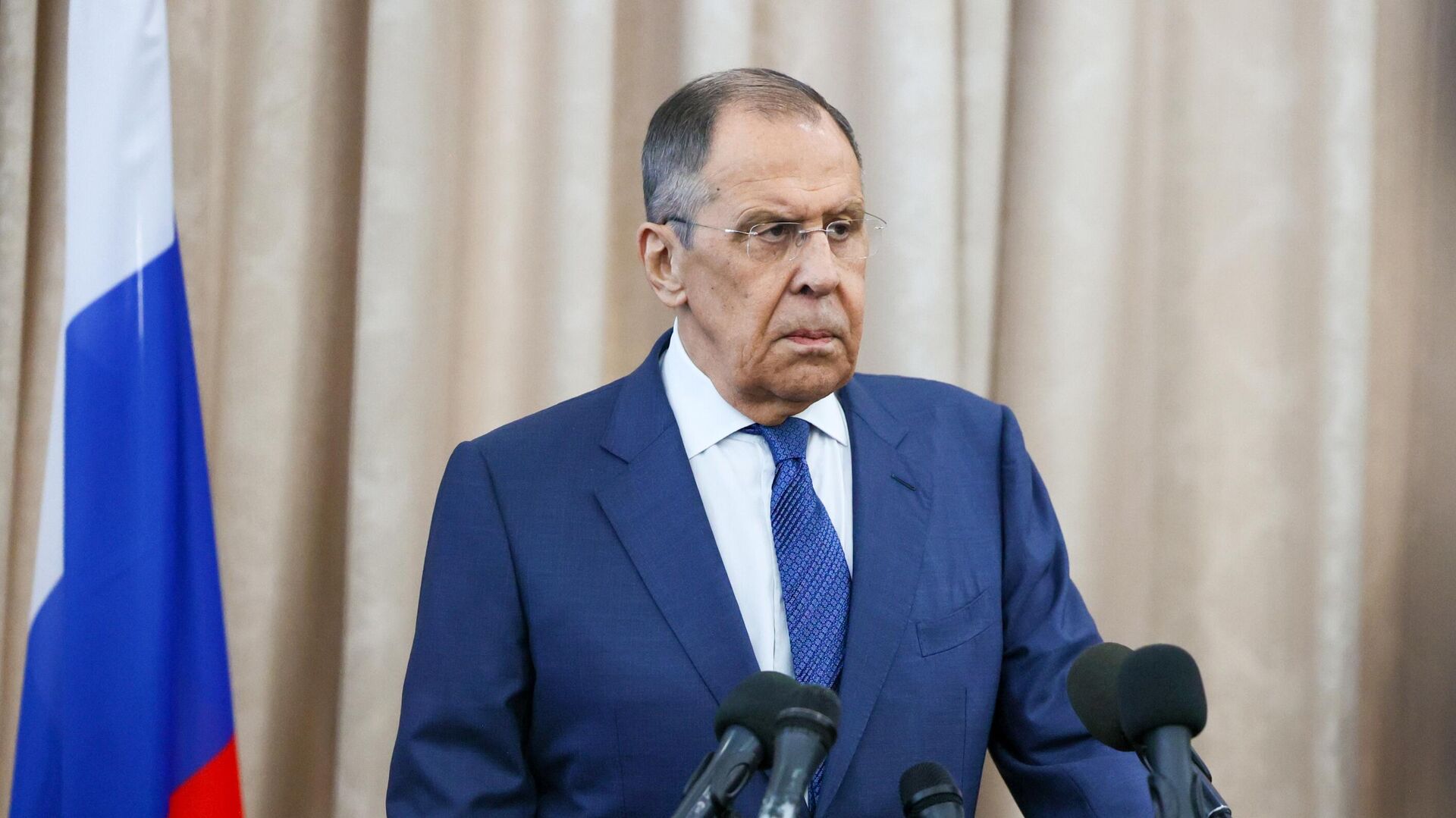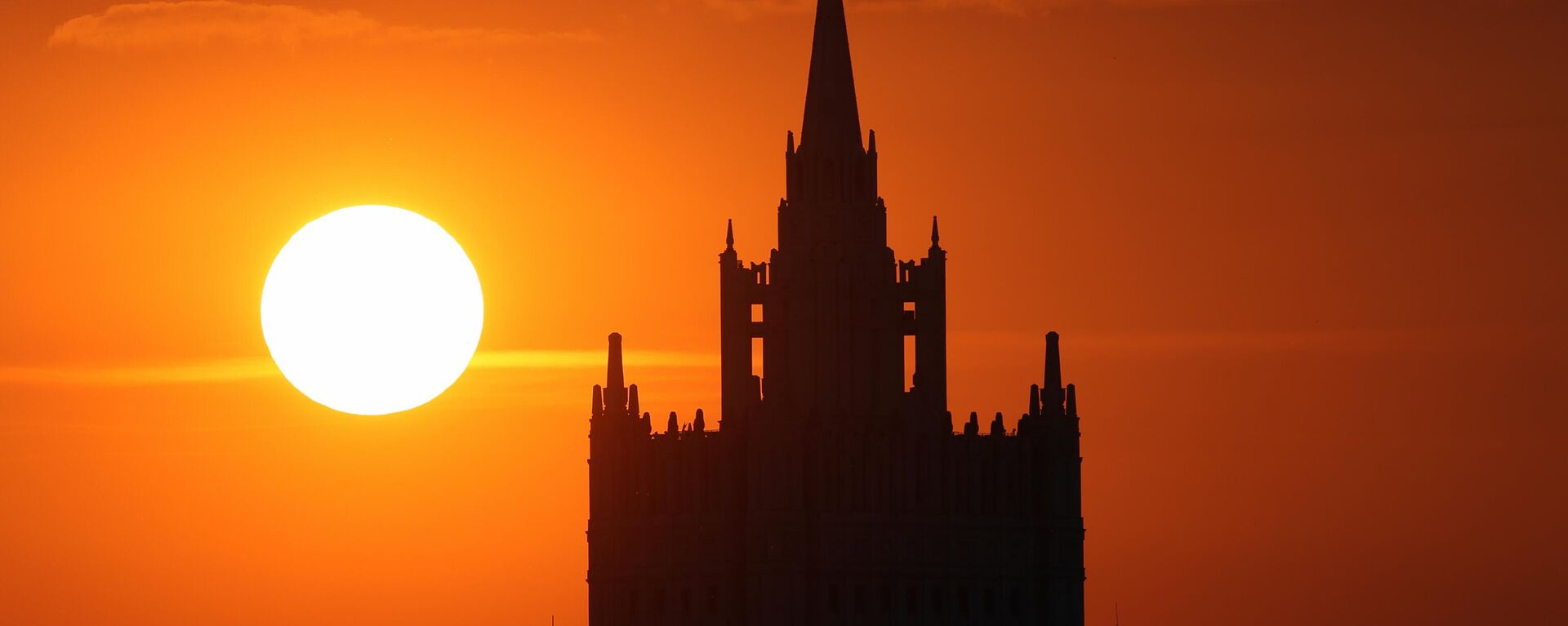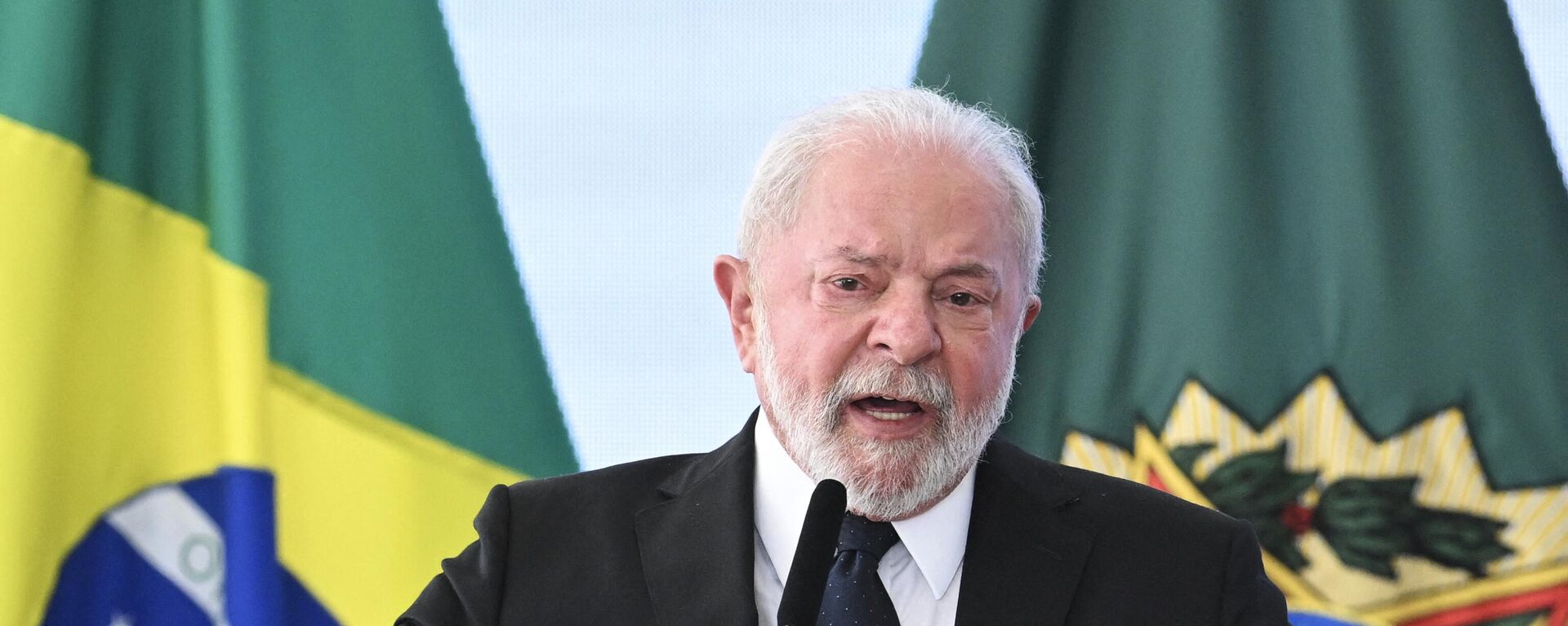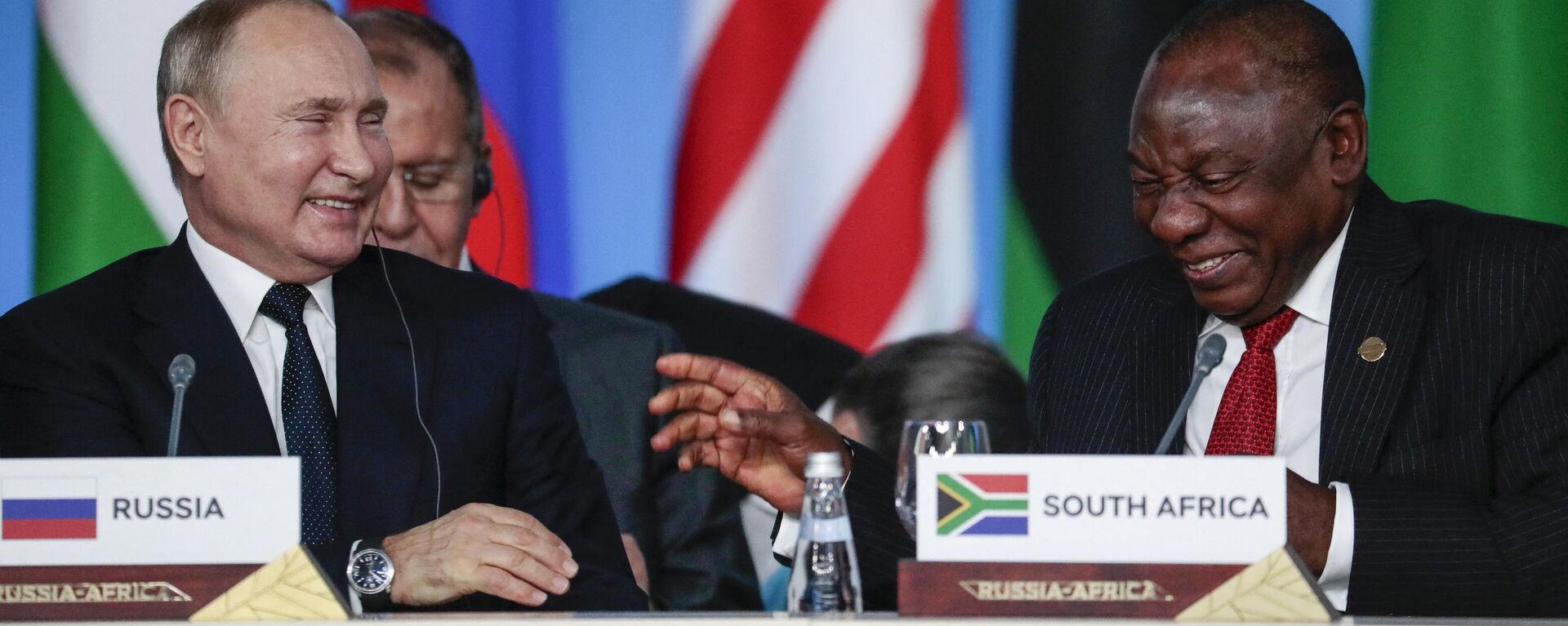https://en.sputniknews.africa/20230417/russia-is-seen-as-challenger-of-unipolar-world-experts-on-lavrovs-visit-to-latin-america-1058652898.html
'Russia Is Seen As Challenger of Unipolar World': Experts on Lavrov's Visit to Latin America
'Russia Is Seen As Challenger of Unipolar World': Experts on Lavrov's Visit to Latin America
Sputnik Africa
A Russian delegation led by Foreign Minister Sergei Lavrov will visit Brazil, Venezuela, Cuba and Nicaragua April 17-21. Sputnik asked experts about the objectives of the participants in this diplomatic tour.
2023-04-17T09:24+0200
2023-04-17T09:24+0200
2023-04-17T09:24+0200
opinion
russia
brics
brazil
china
south africa
india
foreign ministry
foreign minister
sergey lavrov
https://cdn1.img.sputniknews.africa/img/07e7/02/09/1057876007_0:0:2829:1591_1920x0_80_0_0_8bcfb543d0042dfbfc24e5c8bf0e541e.jpg
The Russian Foreign Ministry explained that the Russian minister is flying to the region with a specific agenda aimed at strengthening mutually beneficial cooperation in political, trade and economic, educational, humanitarian, cultural and other areas. According to Lavrov himself, the Russian authorities consistently "stand for strengthening Russian-Latin American cooperation on the basis of mutual support, solidarity and taking into account each other's interests." The diplomat stressed that Moscow is ready for further development of contacts at the level of heads of states and governments, parliaments, diplomatic services and other ministries.In an interview with Sputnik, Jonathan Benavides, a Venezuelan political scientist who specializes in the geopolitics of Russia, Eastern Europe and the Middle East, said that Lavrov's visit is consistent with Russia's intention to move towards a multipolar world. Amando Basurto, a doctor of political studies at the New School for Social Research in New York, noted in turn that Russia's diplomatic tour of Latin America is aimed primarily at maintaining and expanding Russian cooperation with the countries the delegation is visiting - Brazil, Venezuela, Cuba, and Nicaragua.Dmitry Rozental, director of the Latin America Institute of the Russian Academy of Sciences, agreed with him and stated that the task of the Russian delegation is "to maintain with them (these countries - ed.) constructive relations, to demonstrate our political presence in Latin America," which is "of great importance."AlliesBenavides, a professor at Venezuela's Central University, said Lavrov's visit to Havana, Caracas and Managua seems logical because these three countries have always been Moscow's political allies.Rosenthal, in turn, supposes that the policy of the three above-mentioned countries must not be considered exclusively anti-Western. The expert reminded that Cuba and Venezuela, for example, tried to get closer to the US in trade, despite the fact that the government of the republic politically distances itself from Washington; trade turnover between Nicaragua and the United States is measured in billions of dollars.At the same time, Rosenthal emphasized that Cuba, Venezuela and Nicaragua are Russia's traditional partner countries, with which Moscow has been maintaining stable relations since the early 2000s.Brazil, a key country in the regionThe Venezuelan expert Jonathan Benavides paid special attention to the upcoming visit of the Russian delegation to Brazil, one of the regional powers that has a different kind of relationship with Moscow than the other states on the tour.In this regard, Basurto, who is also a professor at the National Autonomous University of Mexico (NAUM), believes that Brazil can take advantage of Lavrov's visit to expand economic ties. Both Russia and Brazil have recently touched on the topic of abandoning the dollar and switching to other currencies for mutual settlements. Commenting on this perspective, Dmitry Rosenthal stated that there may be some progress in this matter following the visit of the Minister of Foreign Affairs of the Russian Federation to Brasilia. However, the expert warned that one should not expect exceptionally radical changes or quick implementation.The Russian diplomats' Latin American tour reinforces Russia's positions in the region, Benavides stressed in turn.
https://en.sputniknews.africa/20230331/1058539773.html
https://en.sputniknews.africa/20230416/1058642183.html
https://en.sputniknews.africa/20230408/1058514124.html
russia
brazil
china
south africa
india
latin america
Sputnik Africa
feedback@sputniknews.com
+74956456601
MIA „Rossiya Segodnya“
2023
News
en_EN
Sputnik Africa
feedback@sputniknews.com
+74956456601
MIA „Rossiya Segodnya“
Sputnik Africa
feedback@sputniknews.com
+74956456601
MIA „Rossiya Segodnya“
latin amerika, sergey lavrov, russian foreign minister, foreign minister, russian foreign ministry, brics countries, brics nations, mutually beneficial, expert's opinion, multipolar world, unipolar world, ditching dollar
latin amerika, sergey lavrov, russian foreign minister, foreign minister, russian foreign ministry, brics countries, brics nations, mutually beneficial, expert's opinion, multipolar world, unipolar world, ditching dollar
'Russia Is Seen As Challenger of Unipolar World': Experts on Lavrov's Visit to Latin America
A Russian delegation led by Foreign Minister Sergei Lavrov will visit Brazil, Venezuela, Cuba and Nicaragua on April 17-21. Sputnik asked experts about the objectives of the participants in this diplomatic tour.
The Russian Foreign Ministry explained that the Russian minister is flying to the region with a specific agenda aimed at
strengthening mutually beneficial cooperation in political, trade and economic, educational, humanitarian, cultural and other areas.
"At the center of the negotiations we plan to put the issues of strengthening the international legal foundations of the modern world, the bearing structure of which is the UN Charter," the ministry said.
According to Lavrov himself, the Russian authorities consistently "
stand for strengthening Russian-Latin American cooperation on the basis of mutual support, solidarity and taking into account each other's interests." The diplomat stressed that Moscow is ready for further development of contacts at the level of heads of states and governments, parliaments, diplomatic services and other ministries.
"For us, Latin America is a friendly region, one of the centers of formation of a multipolar world, with which Russia intends to maintain a dynamic dialogue, develop constructive cooperation, not subject to any dictate from the outside," the Russian Foreign Ministry said.
In an interview with Sputnik, Jonathan Benavides, a Venezuelan political scientist who specializes in the geopolitics of Russia, Eastern Europe and the Middle East, said that Lavrov's visit is consistent with Russia's intention to move towards a multipolar world.
Amando Basurto, a doctor of political studies at the New School for Social Research in New York, noted in turn that Russia's diplomatic tour of Latin America is aimed primarily at maintaining and expanding Russian cooperation with the countries the delegation is visiting - Brazil, Venezuela, Cuba, and Nicaragua.
Dmitry Rozental, director of the Latin America Institute of the Russian Academy of Sciences, agreed with him and stated that the task of the Russian delegation is "to maintain with them (these countries - ed.) constructive relations, to demonstrate our political presence in Latin America," which is "of great importance."
Benavides, a professor at Venezuela's Central University, said Lavrov's visit to Havana, Caracas and Managua seems logical because these three countries have always been Moscow's political allies.
"These are four countries that are of key importance to Russia in Latin America, but we can divide them into two groups: [the first would include] Venezuela, Cuba and Nicaragua, because they are not only trading partners but also political allies [of Moscow], three countries that in Latin America maintain a course to confront the United States, and they certainly see Russia as a country that has seriously challenged the unipolar order that the United States has tried to maintain since the 1990s and seeks to create multipolarity in geopolitics," he outlined.
Rosenthal, in turn, supposes that the policy of the three above-mentioned countries must not be considered exclusively anti-Western.
The expert reminded that Cuba and Venezuela, for example, tried to get closer to the US in trade, despite the fact that the government of the republic politically distances itself from Washington; trade turnover between Nicaragua and the United States is measured in billions of dollars.
"These three countries are first and foremost trying to pursue their own national interests and are probably trying to get some kind of benefit from interaction with both Russia and the countries of the collective West," he said.
At the same time, Rosenthal emphasized that Cuba, Venezuela and Nicaragua are Russia's traditional partner countries, with which Moscow has been maintaining stable relations since the early 2000s.
"These are countries with which we have relations of a strategic nature," the expert also stated.
Brazil, a key country in the region
The Venezuelan expert Jonathan Benavides paid special attention to the upcoming visit of the Russian delegation to Brazil, one of the regional powers that has a different kind of relationship with Moscow than the other states on the tour.
"Brazil belongs to a different category, in its case we are talking about a different relationship, because Brazil is part of the BRICS group along with Russia, China, India and South Africa. So here we can talk about a different interaction, which is more directly related to the trade and economic spheres, as well as to the repositioning of these states in the search for a world order that is changing from unipolar to multipolar," he stressed.
In this regard, Basurto, who is also a professor at the National Autonomous University of Mexico (NAUM), believes that Brazil can take advantage of Lavrov's visit to
expand economic ties.
"Brazil intends to do two things: first, to use the BRICS channel to maintain and increase economic flows between these countries, including, of course, India and China; and second, Brazil offers itself – within the same BRICS group and together with China – as a country that negotiates a peaceful settlement of the conflict [in Ukraine]. This is why it is important for Brazil to see this, in other words, so it [Brazil] has more geopolitical space, so it can make itself known loudly," he explained.
Both Russia and Brazil have recently touched on the topic of
abandoning the dollar and switching to other currencies for mutual settlements.
Commenting on this perspective, Dmitry Rosenthal stated that there may be some progress in this matter following the visit of the Minister of Foreign Affairs of the Russian Federation to Brasilia. However, the expert warned that one should not expect exceptionally radical changes or quick implementation.
"It is necessary to understand how payments in national currencies will function. It is necessary to understand why we need such a large number of reals, which we can get, what we will do with them then, where they will go. Although the idea is correct, given that the dollar and the dollarization of the economy is one way to simplify the US sanctions policy," says the head of the Institute of Latin America of the Russian Academy of Sciences.
The Russian diplomats' Latin American tour reinforces Russia's positions in the region, Benavides stressed in turn.
"The visit is exactly in line with Russia's foreign policy doctrine, the part of it that establishes pragmatic relations with the rest of the world, with the so-called far abroad," he said.




